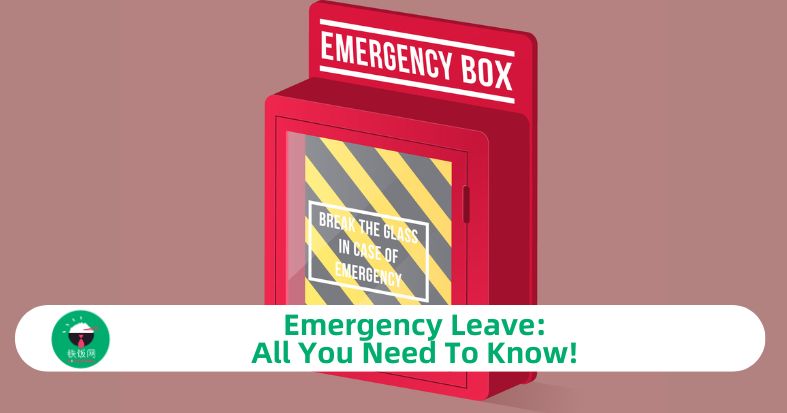
Emergency Leave: All You Need To Know!

by Chloe Chan
Emergency leave is when we need to take time off suddenly due to unforeseen circumstances. It could be a personal illness or injury, the illness or death of a family member, natural disasters, military service, court appearances, or any other unexpected events that demand our immediate attention. It's different from our regular vacation or sick leave and may or may not be paid, depending on our company's policies.
Common Reasons for Emergency Leave
There are numerous reasons why we might need emergency leave, but here are some of the most common ones:
- Serious illness or injury: When we or our family members are dealing with a major health issue that requires immediate attention, emergency leave is necessary.
- Death of a family member: Losing a loved one is a difficult time, and we need time off to grieve and take care of funeral arrangements.
- Family emergencies: Sometimes, our family members might need urgent help or support, and emergency leave allows us to be there for them.
- Natural disasters or emergencies: When a natural disaster strikes, such as a hurricane or earthquake, we may need time off to deal with the aftermath or ensure our own safety.
- Military service or deployment: If we are called to serve in the military or get deployed to a different location, emergency leave is essential for fulfilling our duties.
- Court appearances or jury duty: When we have to show up in court or serve on a jury, we have the right to take time off from work.
- Unforeseen circumstances: Sometimes, unexpected events like sudden home repairs or car accidents require our immediate attention and necessitate emergency leave.
- Mental health or medical issues: If we are going through mental health challenges or other medical issues that require close attention, emergency leave gives us the time to seek treatment and recover.
Compensation and Duration of Emergency Leave
The compensation and duration of emergency leave can vary depending on our company's policies. Some employers offer paid emergency leave as part of their benefits, while others provide unpaid leave. We need to familiarize ourselves with our company's policy on compensation during emergency leave. The duration of emergency leave is usually determined by our employer's policy as well. Some employers have a set unpaid leave period, while others allow us to take as much time as we need, within reason. It's a good idea to have a conversation with our employer to understand the specific guidelines for emergency leave duration.
Emergency Leave Process
In some companies, we may need to follow a specific process to request emergency leave. This often involves filling out an emergency leave application, which requires us to provide details about the emergency situation, the duration of leave needed, and any other relevant information. We must understand our employer's policies and procedures for emergency leave applications. By following the correct application process, we can ensure that our leave is properly documented and approved.
Tips for Navigating Emergency Leave
Navigating emergency leave can be challenging, but with the right approach, we can handle it smoothly. Here are some tips for us as employees:
- Know the policy: Familiarize ourselves with our company's emergency leave policy. Understand how to request and get approval for emergency leave. Make sure we have easy access to this policy.
- Communicate openly: When we need emergency leave, communicate openly and honestly with our employer. Explain the situation and the need for time off. It's important to keep the lines of communication open.
- Provide necessary documentation: Depending on the situation, our employer may require documentation such as a medical certificate or proof of a family emergency. Be prepared to provide these documents to ensure that our leave is justified.
- Plan ahead: If possible, plan ahead for emergency situations. Keep emergency contact numbers handy, have a backup plan for work coverage, and inform trusted colleagues or supervisors about our situation.
- Take care of ourselves: During emergency leave, prioritize self-care. Take the time to rest, recover, and address the situation at hand. Seek support from friends, family, or professional resources if needed.
Remember, emergencies happen, and we need to navigate emergency leave with clarity and professionalism. By knowing our company's policy, communicating openly, providing necessary documentation, planning ahead, and taking care of ourselves, we can handle emergency leave in the best possible way.
FAQ's On Emergency Leave
- Q: Will I be paid during emergency leave?
- A: It depends on our company's policy. Some employers offer paid emergency leave as part of their benefits, while others provide unpaid leave. It's crucial to review our company's policy to understand the compensation we can expect during emergency leave. If it is unpaid, we may need to explore other options such as using our accrued vacation or sick leave, or even considering short-term disability benefits if applicable.
- Q: How do I request emergency leave?
- A: The process for requesting emergency leave may vary depending on our company's policies. In most cases, we will need to inform our supervisor or manager as soon as possible about the situation that requires us to take leave. It's important to communicate the nature of the emergency and the estimated duration of our absence. Some companies may require us to fill out a formal leave request form or submit a written request explaining the circumstances. It's crucial to follow our company's guidelines and procedures to ensure that our leave is properly documented and approved.
- Q: Can my employer deny my request for emergency leave?
- A: While employers generally understand the need for emergency leave, there may be situations where our request could be denied. This could happen if we fail to provide sufficient documentation or if our absence would cause significant disruption to the company's operations. However, employers are typically understanding and compassionate in such circumstances. It's important to have open and honest communication with our employer, explaining the urgency and importance of our leave. If our request is denied, we can explore alternative options such as using other available leave options or discussing a flexible work arrangement.
- Q: What if I need to extend my emergency leave?
- A: Sometimes, the duration of our emergency situation may exceed our initial estimation. If we need to extend our leave, it's crucial to inform our employer as soon as possible. We should provide updated information on the situation and the new expected return date. It's important to keep the lines of communication open and maintain regular contact with our employer during our absence. By staying in touch and providing updates, we can ensure that our employer is aware of our circumstances and can plan accordingly.
- Q: How can I manage my workload before and after emergency leave?
- A: Planning ahead can help us manage our workload effectively. Before taking emergency leave, it's a good idea to communicate with our colleagues or supervisors about pending tasks or projects. We can delegate responsibilities or ask for assistance in completing urgent assignments. It's important to provide clear instructions and documentation to ensure a smooth transition of work during our absence. When returning from emergency leave, we should prioritize tasks based on their urgency and seek support from our team members if needed. Taking the time to organize and prioritize our workload can help us ease back into our responsibilities smoothly.
Read More On Ricebowl :
- Income Tax E-Filing in Malaysia 2024 (Step-by-Step Guide)
- SOCSO: Protecting Malaysian Workers, Ensuring Social Security.
- Public Holiday Malaysia 2024 : From Thaipusam to Year - End
- Interview Tips : For Career Changers, Land Your Dream Job in a New Field
- Emergency Leave Reasons: Top 20 Common Work-Life Scenarios
Popular Jobs:
Find More Jobs|Apprenticeship|Contract Jobs|Internship|Part Time Jobs|Full Time Jobs|Hybrid Work|Freelance Jobs|Admin Jobs|Marketing Jobs|Sales Jobs|Fresh Grad Jobs|Work From Home Jobs|WFH Customer Service
Career Guide:
Resume Template|Cover Letter Template| Interview Questions & Answers|Career Development |Salary & Job Description
Location:
Singapore| Kuala Lumpur|Penang|Petaling Jaya, Selangor|Shah Alam, Selangor|Kuching|Johor|Melaka|Kuantan, Pahang|Ipoh